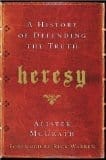Heresy


I’m really looking forward to reading Heresy: A History of Defending the Truth by Alister McGrath.
In Heresy, leading religion expert and church historian Alister McGrath reveals the surprising history of heresy and rival forms of Christianity, arguing that the church must continue to defend what is true about Jesus. He explains that remaining faithful to Jesus’s mission and message is still the mandate of the church despite increasingly popular cries that traditional dogma is outdated and restricts individual freedom.
I grew up in a setting in which the term heretic was thrown around a little too freely. I remember Michael Haykin warning us one day in seminary that it’s a label that we should never use glibly as an accusation.
But the opposite is happening now. The term is being used glibly, but not as an accusation. It’s been used as a badge of honor.
In 1995, Thomas C. Oden wrote:
An interloper who steals property must be caught and charged. Thinly disguised atheism and neopaganism are interlopers in liberated church circles. They have engaged in the theft of church property. The stolen property must be reclaimed and the thieves brought to justice.
To point this out means raising the issue of heresy. But in the “liberated” church circles of oldline denominations heresy simply does not exist. After centuries of struggle against recurrent heresies, Christians have found a quick way of overcoming heresy: they have banished the concept altogether. With absolute relativism holding sway, there is not only no concept of heresy, but no way even to raise the question of where the boundaries of legitimate Christian belief lie.
This is like trying to have a baseball game with no rules, no umpire, and no connection with historic baseball. Only we continue to insist on calling it baseball because a game by the name of baseball is what most people still want to see played…
The intellectual ethos I am describing is not liberal in the classic sense of that word, but intolerant and uncharitable when it comes to traditionalists of any sort, all of whom are capriciously bundled under the dismissive label of “fundamentalists.”
What he writes still applies today, but not just in what you would call the liberal church.
Heresy is too important a term to lose, or to use glibly either as an accusation or as a badge of honor. It’s not a comfortable topic, but it’s still an important one.






